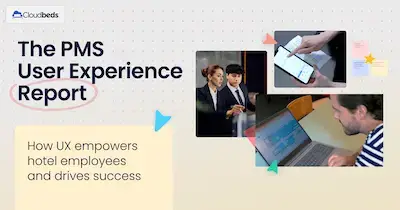
By Lana Cook
Accounting software is more than just another application in your tech stack. It’s the backbone of hotel operations, helping handle transactions, track income and expenses, maintain compliance, and analyze performance.
However, to be effective, accounting software must have deep integrations with other systems, mainly the property management system.
In this article, we explore how to effectively integrate financial data to enhance the performance of your accounting software, along with features to look for and five of the best systems on the market for hotels.
Hotel accounting software is a specialized type of software designed specifically for the hotel industry. Today’s solutions are predominantly cloud-based and streamline tasks, including tracking revenues and expenses, generating and interpreting financial reports, managing vendor and employee payments, and processing guest invoices. Accounting software often integrates with hotel management software, including the PMS and point of sale (POS) system, to automate operations and provide a comprehensive view of a hotel’s financial health and key business intelligence. What is hotel accounting software?
The problem of data integrity
For accounting software to work effectively, it must collect and import financial data across a hotel’s technology ecosystem. The primary systems involved include:
- PMS. Home to most financial data from the front and back office, such as revenue from rooms, payment processing, deposits, and accounts receivables.
- POS system. Records sales data from the F&B department as well as other revenue-generating areas like shops, spas, and additional services.
- Inventory and procurement systems. Track costs related to F&B, as well as other goods and services.
- Housekeeping software. Monitors costs related to inventory management, including cleaning supplies, textiles, and laundry services.
- Payroll software. Manages employee salaries, benefits, taxes, and other expenses.
- Channel manager. Keeps track of commissions charged by Online Travel Agencies (OTAs) and other sales channels.
- Revenue management system. Although it doesn’t capture financial transactions directly, it provides key metrics like revenue per available room (RevPAR), Average Daily Rate (ADR), and rate trend forecasts.
With hotels using an average of 20-30 tech vendors, there is a lot of data to keep straight. What’s more, it must be categorized and reported according to specific accounting principles. The most used standard in the hospitality industry is USALI (Uniform System of Accounts for the Lodging Industry).
USALI organizes hotels’ bookkeeping into three main revenue/cost centers—rooms, F&B, and other departments (e.g., spa, golf club), and uses an accrual-based system, meaning that revenues and costs are recorded when they are incurred, not necessarily when cash is received or paid. For example, costs related to front desk and housekeeping personnel will be allocated differently from those for restaurant staff, while costs for cleaning supplies used in rooms will be allocated differently from those used in the spa. The same applies to revenue. While a key hotel metric like TRevPAR (total revenue per available room) will include F&B and other services, these will be reported separately in the accounting system. What is USALI?
How a PMS works with accounting software
It can be challenging to ensure that all financial data flows seamlessly across sources into the accounting system. Rather than attempting to connect every application directly, a more efficient approach is to choose a PMS built with accounting integrations in mind. Acting as the source of truth, data flows into the PMS from other systems, where it’s then formatted and consolidated in a way that makes it easy to transfer to accounting software.
Managing data this way ensures that data is properly integrated without discrepancies, inconsistencies, duplicate entries, or data loss. To sum it up, a PMS with robust accounting functionality provides the following benefits:
1. It creates a single source of truth
Once all financial data from different sources is mapped to the PMS, your hotel accounting software only needs a single solid integration with the PMS. This way, the PMS functions as a single source of truth for financial transactions and helps maintain data integrity, eliminating the need for manual bank reconciliation.
2. It makes more financial reports available
A PMS built with accounting functionality in mind offers additional modules that help provide deeper insights into performance, such as:
- Outstanding balance reports listing guests or accounts with unpaid balances, the amount owed, and debt age.
- Guest ledger reports detailing all financial transactions associated with a guest’s stay, including room charges, amenities, and payments.
- Taxes and fee reports summarizing room taxes, resort fees, or municipal taxes collected by the hotel.
- Void and refund reports tracking cancellations, adjustments, voided transactions, and refunds.
- Adjustment reports, tracking changes or corrections made to a hotel’s financial transactions after they were initially recorded.
Although you will still need a dedicated hotel accounting solution, these reports can provide business owners outside of the accounting department with useful insights and financial statements to manage cash flow, reconcile guest accounts, comply with fiscal laws, detect potential frauds, and create audit trails showing when transactions were made and by whom.
3. It enhances the functionalities of the accounting software
The functionalities within the PMS ensure that transactions are pre-categorized and grouped before they enter the accounting system, giving hoteliers the flexibility to choose what data will flow and the confidence that it’s accurate. This type of setup enhances the reporting capabilities of your accounting software, allowing for deeper insights and less manual work.
8 features to look for in hospitality accounting software
For efficient accounting, it’s crucial to invest in the right PMS and accounting software. When choosing an accounting system for your hotel business, consider these key features:
Integration capabilities
Look for a strong API connection that allows seamless two-way synchronization with your PMS and, when necessary, with other key applications (like payroll).
Hospitality-specific design
While generic accounting software may work for smaller properties, it becomes a limiting factor for larger or multi-property hotel organizations. A hotel-specific solution provides greater access to industry data and is more likely to adhere to hotel accounting standards.
Compliance with USALI
Having a USALI-compliant accounting solution will facilitate comparative analysis between hotel operations and departments and save you time and manual effort in converting generic charts of accounts into USALI-based formats.
Automation
Issuing invoices, managing vendor payments, processing payroll, and matching receipts with bank transactions are all examples of traditionally repetitive manual accounting tasks that a good accounting system should automate.
Real-time financial management
Integration with your PMS should unlock real-time insights into revenues, expenses, and profitability so you can manage cash flow more effectively and address financial issues as they occur.
Advanced forecasting and budgeting
These features use historical trends and industry benchmarks to predict financial performance, helping you plan resources, control expenses, and optimize pricing strategies.
Permissions-based access and reporting
For accounting teams, permissions-based access helps maintain data integrity by controlling who can view, edit, or create reports. This reduces the risk of errors and ensures the security of sensitive financial information.
Multi-property functionality
For multi-property operations, the accounting system should offer both consolidated and individual property reporting. This simplifies financial oversight, supports performance comparisons, and provides a clearer understanding of each property’s profitability for scalability.
5 best hotel accounting software solutions
Cloudbeds PMS integrates with leading hotel accounting software, including:
Inn-Flow
Inn-Flow offers hoteliers real-time insights and robust reporting features, helping to enhance budget control and simplify financial processes. By consolidating functions like payroll and invoice management into a single platform, it reduces operational costs and administrative burdens.
Intacct
Sage Intacct is a robust solution tailored for hoteliers, featuring advanced reporting capabilities for greater insights into RevPAR, occupancy rates, profitability, and budget forecasting. It automates many reporting tasks and provides real-time performance tracking across multiple locations.
M3
M3 is an accounting solution natively built for hotels. It offers a high degree of customization, including the ability to use a chart of accounts based on the latest USALI standards or a customizable format. The software imports data from the PMS automatically and provides powerful financial reporting.
Quickbooks
Quickbooks Online is an accounting solution designed for small to medium-sized businesses. Its functionalities include payroll management, time tracking for productivity, and automatic matching of receipts to bank transactions. It also supports collaboration with external accountants and features a real-time dashboard with customizable reports, such as balance sheets, profit & loss and cash flow statements, and the possibility to connect an external accountant.
Xero
Xero is an accounting software with a business analytics functionality allowing hoteliers to track cash flow and generate short-term financial projections and key performance forecasts. While it includes basic payroll capabilities, Xero can also connect to third-party dedicated payroll solutions for more advanced needs.
Integrating accounting software into your hotel tech stack
Financial reporting provides hotels with an independent verification of financial and operating results as well as insights for informed decision-making. Accurate reporting, however, depends on the accuracy of data used by your accounting software.
Rather than turning your accounting solution into an integration hub, a smarter approach is to choose a PMS that can handle the heavy lifting of converting, formatting, and validating financial data across all operations and then funnel it to the accounting system. By aligning your financial tools and systems, you can unlock the full potential of your hotel’s financial strategy.


















